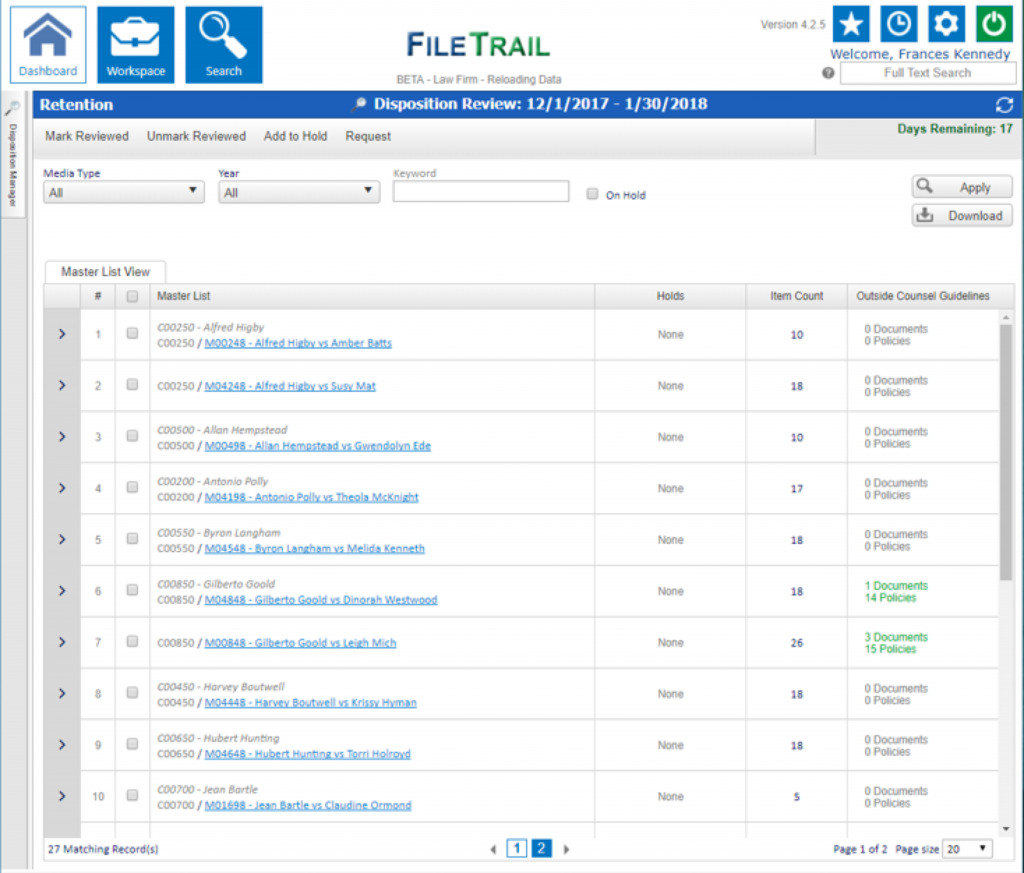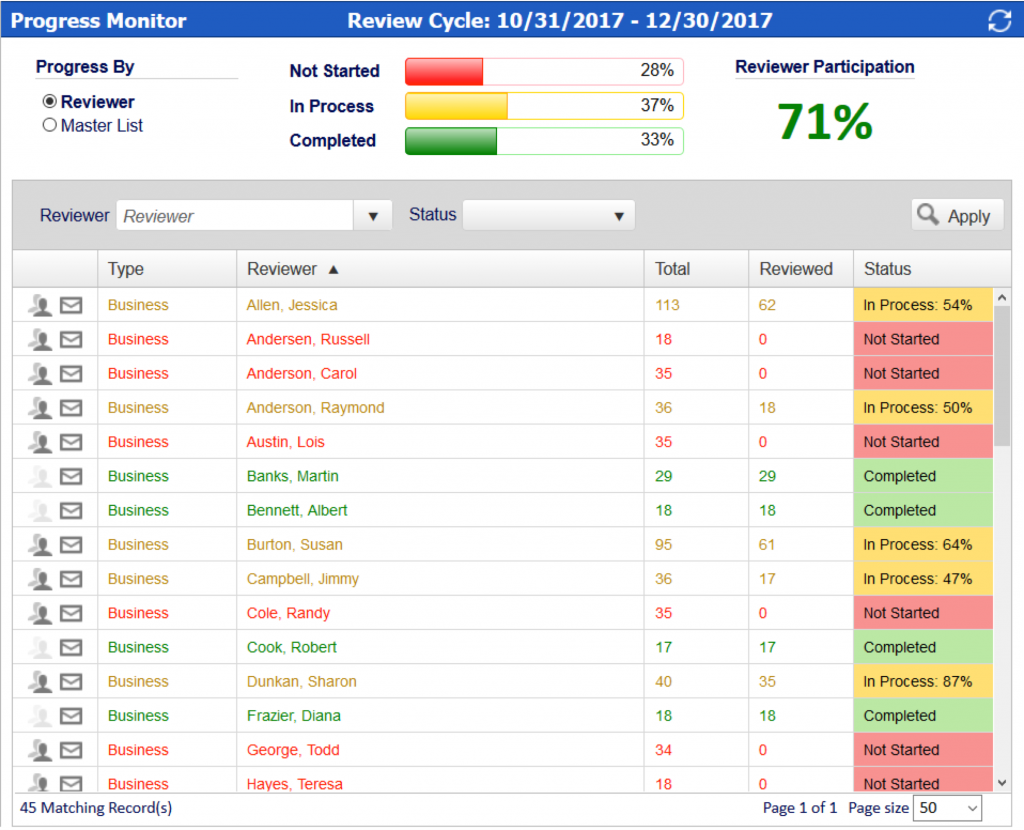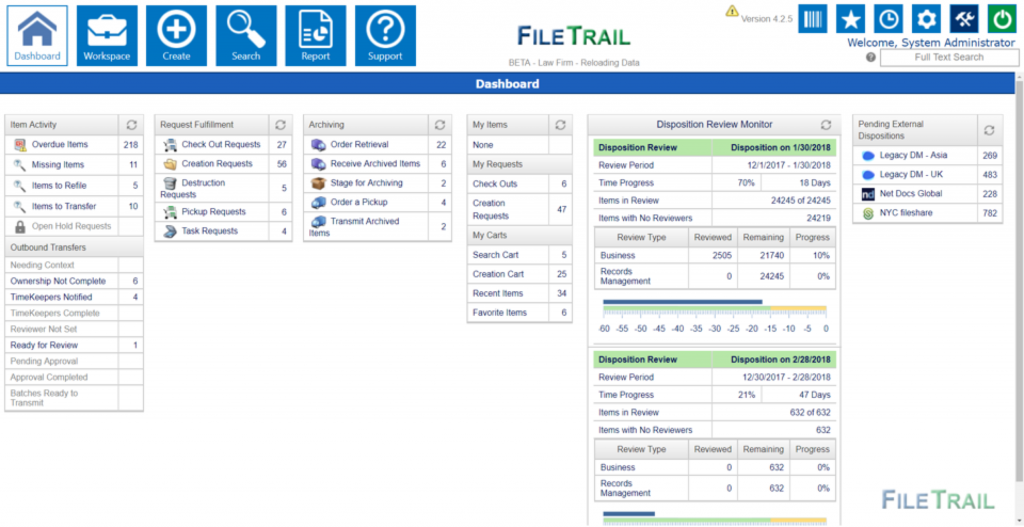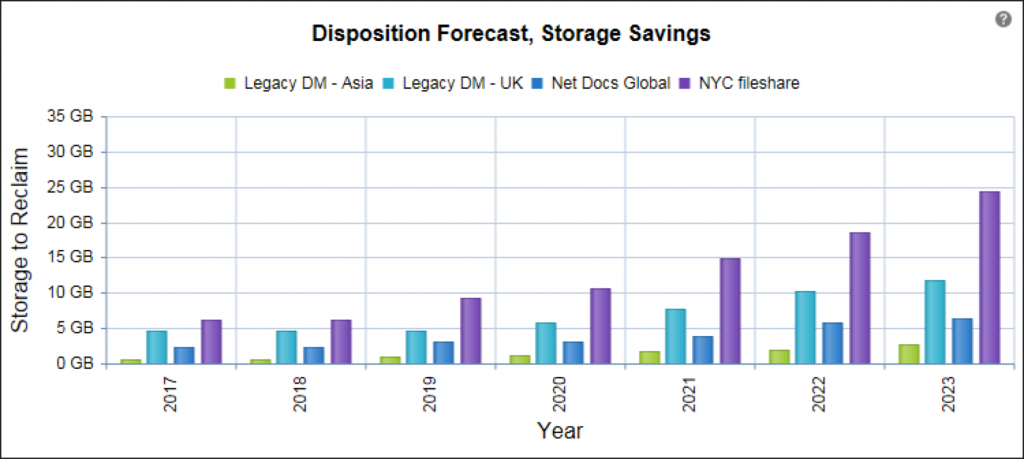Review: FileTrail GPS for Law Firms Reins in Documents from the Outer Limits of Retention
Sean Doherty tests FileTrail GPS for Law Firms, which automatically classifies and applies retention policies to documents and automates the disposition, review, and destruction of documents.
April 09, 2018 at 10:00 AM
7 minute read

Most law firms have information governance (IG) policies to determine document lifecycle and the limits of document retention, but they fail to implement the strategy or do so in an inconsistent manner. Big mistake. Firms that retain client information long after matters are closed, and documents reach the outer limits of retention, overpay for the cost of maintaining physical records and increase the risk that old client data, even corporate secrets, may be exposed to unauthorized access from e-discovery, a data breach, or malicious insider activity.
Client documents may also find their way beyond the law firm boundaries to e-discovery repositories, shared drives, and Web-based file-sharing services where they are no longer subject to retention policies. Out of sight and out of mind until a hacker, insider, or litigant brings them to the firm's attention. If you're looking for a silver bullet for these problems, investigate FileTrail's Governance Policy Suite (GPS), a purpose-built, Web-based platform designed to implement information governance (IG) and retention policies on physical and electronic records. GPS automatically classifies and applies retention policies to documents and automates the disposition, review, and destruction of documents with built-in workflows, email notifications, audit trails, and reports.
For more than 15 years, FileTrail has been developing and implementing enterprise information management products. The San Jose, California-based company launched and demonstrated GPS at Legalweek with a clear focus on the large law firm market in North America, and an eye toward firms in the United Kingdom. GPS can implement a firm's IG policy and incorporate corporate counsel guidelines into retention policies that operate across all local or internetwork repositories via connectors, which are core to the GPS platform.
Connectors discover and monitor documents, images, folders, and workspaces in repositories. Connectors pass metadata, such as URL, key title, and document size, to GPS to apply IG policies and compile audit trails of the disposition cycle to show records were destroyed according to policy. But connectors do not duplicate a DMS audit trail of who accesses what, when. FileTrail makes connectors for Box, HighQ, iManage (versions 5-10), Microsoft SharePoint, NetDocuments, and OpenText eDOCS. Future connectors will be client-driven.
FileTrail also makes connectors for off-site records storage services, such as DataSafe and Iron Mountain. These connectors allow users to request the pickup and retrieval of records within their DMS user interface (UI), and view file retention and disposition of physical and electronic records from GPS. But most attorneys will work natively in the GPS browser-based UI when they are alerted via email with a URL link to a pending disposition review of documents.
Hands-On GPS
Most attorneys will find the GPS UI a familiar place to engage and manage the disposition review process. The platform is permission-based and integrates with ethical walls systems, such as Intapp Walls, so attorneys only see and review matters within their purview.
The GPS platform automatically builds disposition review lists based on a user-defined review cycle. As review deadlines loom, the platform triggers a review workflow that automatically sends an email with a URL to the attorney reviewer. If the reviewer fails to complete the review workflow on time, the platform escalates the review to a substitute reviewer or records manager. Review escalation addresses the problem that many firms are presented with after an attorney leaves the firm: Who will review a departing attorney's matters for disposition?
When attorneys click the URL in the email to a disposition review, they are directed to the Disposition Manager. For the period under review, the Manager lists the clients and matters, indicating for each if there are applicable holds or outside counsel guidelines and the number of physical and electronic items to review. See Figure 1, below.

When attorneys open a matter for review, a list of items with metadata identifies the responsible department or practice, file type, location, media type (physical or electronic) and links to history and retention information. From the list, reviewers can select single or multiple items and mark them reviewed, add them to holds, or request the data for further investigation.
At the item level, attorney reviewers can review an audit report for defensible deletion and view properties that list, among other things, the responsible attorney and when the matter was closed. Item level reports can be downloaded in CSV, Excel, or PDF format. Some firms simplify the review for attorneys and configure it to show the matter-level—not the individual documents. Reviewers' progress can be tracked using the Progress Monitor. See Figure 2, below.

Outside of disposition review, users may log in to an actionable dashboard that records tasks that need attention and critical metrics in reports. Many reports are aimed at IG staff who are overseeing disposition review and managing physical records. Dashboard functions include, among other things, report fulfillment status of requests for item creation, destruction, pickup, and tasks (e.g., ship a copy); record items checked out and overdue; and account for items in carts. GPS uses a shopping cart analogy to store and track actions and requests for documents, such as creation and search. Once in a cart, users can add other tasks, such as check-in or check-out documents, to the initial action – thus creating a simple workflow.
The GPS UI sports a sticky ribbon across the top of Web pages to navigate to workspaces, create items, conduct searches, and generate reports. Like Internet browsers, the UI banner has tools to access Favorites and history of documents last accessed that remains persistent through login sessions. To further improve navigation, wherever the platform generates lists of users, clients, matters, or documents, users can apply filters and use a type-ahead function to narrow list items. See Figure 3, below.

The workspace button brings up a hierarchical view of matters that allows users to drill down into items and act on them, such as requesting the item from storage, obtaining an audit report, marking the item for destruction, merging the item with others, and more. The workspace button also has a handy function to create records or a series of records.
The Reports page supplies built-in reports and the ability to build custom reports using an ad-hoc reporting wizard with drag-and-drop functionality and SQL development tools. GPS can build records destruction and disposition reports and forecasts of future space savings. See Figure 4, below.

Other GPS reports include activity by repository, by physical media, and by records center to track items going in and out and costs. Built-in, custom, and graphical reports, and disposition forecasts can be added to dashboards and arranged by user preference.
Besides connectors for repositories and off-site storage services and integration with ethical wall products, GPS works with Intapp's Intake product to bring in rules from new matters. GPS also integrates with billing systems, such as Aderant Expert and Thomson Reuters Elite, to reduce redundant data entries and ensure accuracy bills.
The GPS platform, which comprises SQL databases and Web applications, is available in a private network on Azure or on-premises. The platform is developed on .Net Framework 4.5 and supports LDAP, Windows, and SAML v2 authentication. The Azure infrastructure protects against DDoS attacks, ensures private customer communications and provides disaster recovery. FileTrail encrypts data in transit for Web-based access (HTTPS), file transfers (FTPS), and data files (PGP/GPG) and uses Azure Disk Encryption for data at rest. For US clients, FileTrail stores data in the US. Data storage outside the US is only available for international clients.
FileTrail uses a baseline, annual subscription price for the application, a one-time pricing model for individual connectors, and user access licenses for four different levels of users, which reduces the total cost of ownership.
Sean Doherty is a sole practitioner and freelance writer based in Brooklyn, New York.
This content has been archived. It is available through our partners, LexisNexis® and Bloomberg Law.
To view this content, please continue to their sites.
Not a Lexis Subscriber?
Subscribe Now
Not a Bloomberg Law Subscriber?
Subscribe Now
NOT FOR REPRINT
© 2025 ALM Global, LLC, All Rights Reserved. Request academic re-use from www.copyright.com. All other uses, submit a request to [email protected]. For more information visit Asset & Logo Licensing.
You Might Like
View AllTrending Stories
- 1A Message to the Community: Meeting the Moment in 2025
- 2Ex-Prosecutor Denies on Witness Stand That She Tried to Protect Ahmaud Arbery's Killers
- 3Latham's Lateral Hiring Picks Up Steam, With Firm Adding Simpson Practice Head, Private Equity GC
- 4Legal Restrictions Governing Artificial Intelligence in the Workplace
- 5Failure to Adequately Inform Patients
Who Got The Work
J. Brugh Lower of Gibbons has entered an appearance for industrial equipment supplier Devco Corporation in a pending trademark infringement lawsuit. The suit, accusing the defendant of selling knock-off Graco products, was filed Dec. 18 in New Jersey District Court by Rivkin Radler on behalf of Graco Inc. and Graco Minnesota. The case, assigned to U.S. District Judge Zahid N. Quraishi, is 3:24-cv-11294, Graco Inc. et al v. Devco Corporation.
Who Got The Work
Rebecca Maller-Stein and Kent A. Yalowitz of Arnold & Porter Kaye Scholer have entered their appearances for Hanaco Venture Capital and its executives, Lior Prosor and David Frankel, in a pending securities lawsuit. The action, filed on Dec. 24 in New York Southern District Court by Zell, Aron & Co. on behalf of Goldeneye Advisors, accuses the defendants of negligently and fraudulently managing the plaintiff's $1 million investment. The case, assigned to U.S. District Judge Vernon S. Broderick, is 1:24-cv-09918, Goldeneye Advisors, LLC v. Hanaco Venture Capital, Ltd. et al.
Who Got The Work
Attorneys from A&O Shearman has stepped in as defense counsel for Toronto-Dominion Bank and other defendants in a pending securities class action. The suit, filed Dec. 11 in New York Southern District Court by Bleichmar Fonti & Auld, accuses the defendants of concealing the bank's 'pervasive' deficiencies in regards to its compliance with the Bank Secrecy Act and the quality of its anti-money laundering controls. The case, assigned to U.S. District Judge Arun Subramanian, is 1:24-cv-09445, Gonzalez v. The Toronto-Dominion Bank et al.
Who Got The Work
Crown Castle International, a Pennsylvania company providing shared communications infrastructure, has turned to Luke D. Wolf of Gordon Rees Scully Mansukhani to fend off a pending breach-of-contract lawsuit. The court action, filed Nov. 25 in Michigan Eastern District Court by Hooper Hathaway PC on behalf of The Town Residences LLC, accuses Crown Castle of failing to transfer approximately $30,000 in utility payments from T-Mobile in breach of a roof-top lease and assignment agreement. The case, assigned to U.S. District Judge Susan K. Declercq, is 2:24-cv-13131, The Town Residences LLC v. T-Mobile US, Inc. et al.
Who Got The Work
Wilfred P. Coronato and Daniel M. Schwartz of McCarter & English have stepped in as defense counsel to Electrolux Home Products Inc. in a pending product liability lawsuit. The court action, filed Nov. 26 in New York Eastern District Court by Poulos Lopiccolo PC and Nagel Rice LLP on behalf of David Stern, alleges that the defendant's refrigerators’ drawers and shelving repeatedly break and fall apart within months after purchase. The case, assigned to U.S. District Judge Joan M. Azrack, is 2:24-cv-08204, Stern v. Electrolux Home Products, Inc.
Featured Firms
Law Offices of Gary Martin Hays & Associates, P.C.
(470) 294-1674
Law Offices of Mark E. Salomone
(857) 444-6468
Smith & Hassler
(713) 739-1250






